Unit 10 You're supposed to shake hands.单元知识点归纳 人教版九年级英语全一册
文档属性
| 名称 | Unit 10 You're supposed to shake hands.单元知识点归纳 人教版九年级英语全一册 | 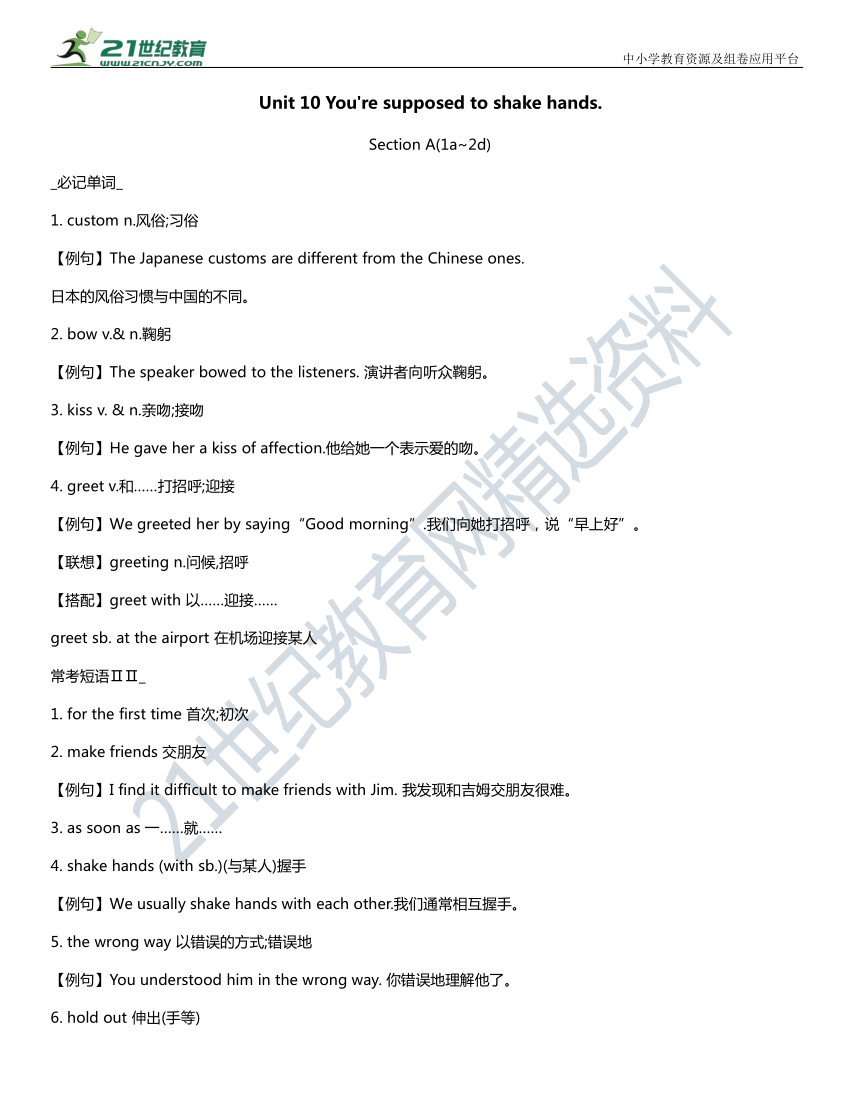 | |
| 格式 | docx | ||
| 文件大小 | 163.1KB | ||
| 资源类型 | 试卷 | ||
| 版本资源 | 人教新目标(Go for it)版 | ||
| 科目 | 英语 | ||
| 更新时间 | 2023-09-09 16:02:41 | ||
图片预览

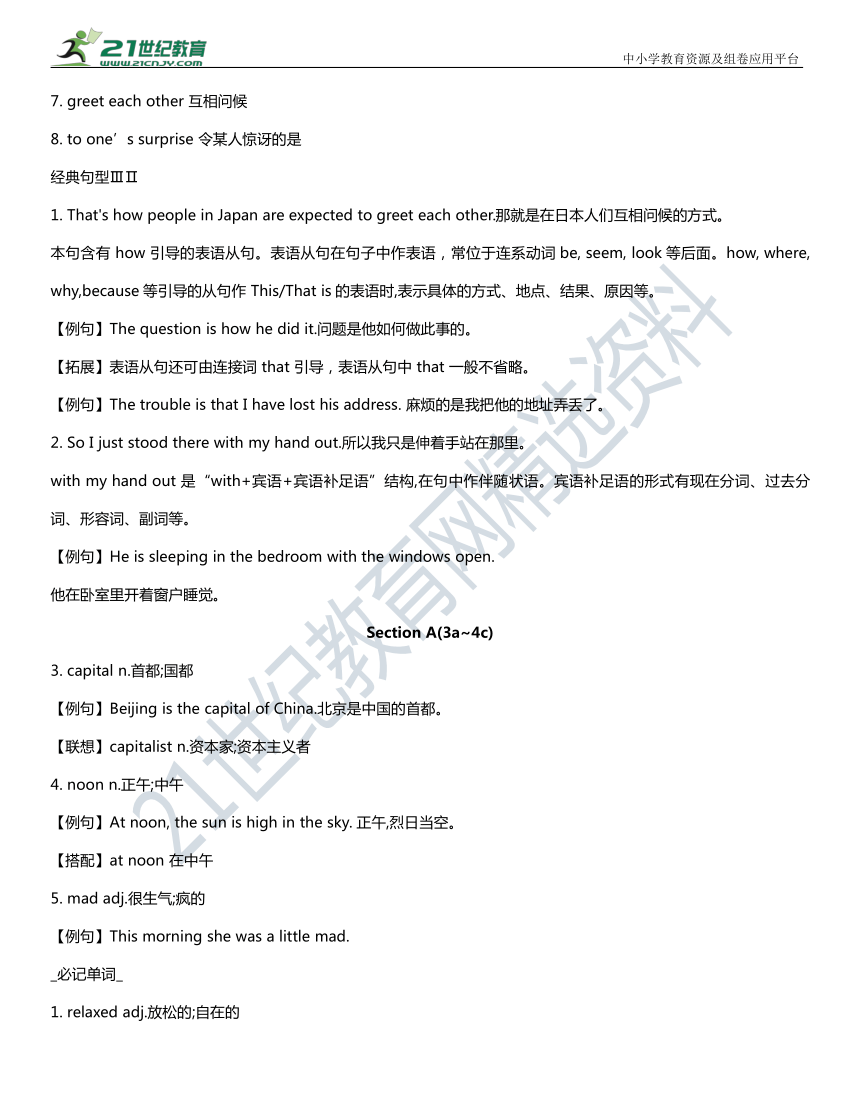
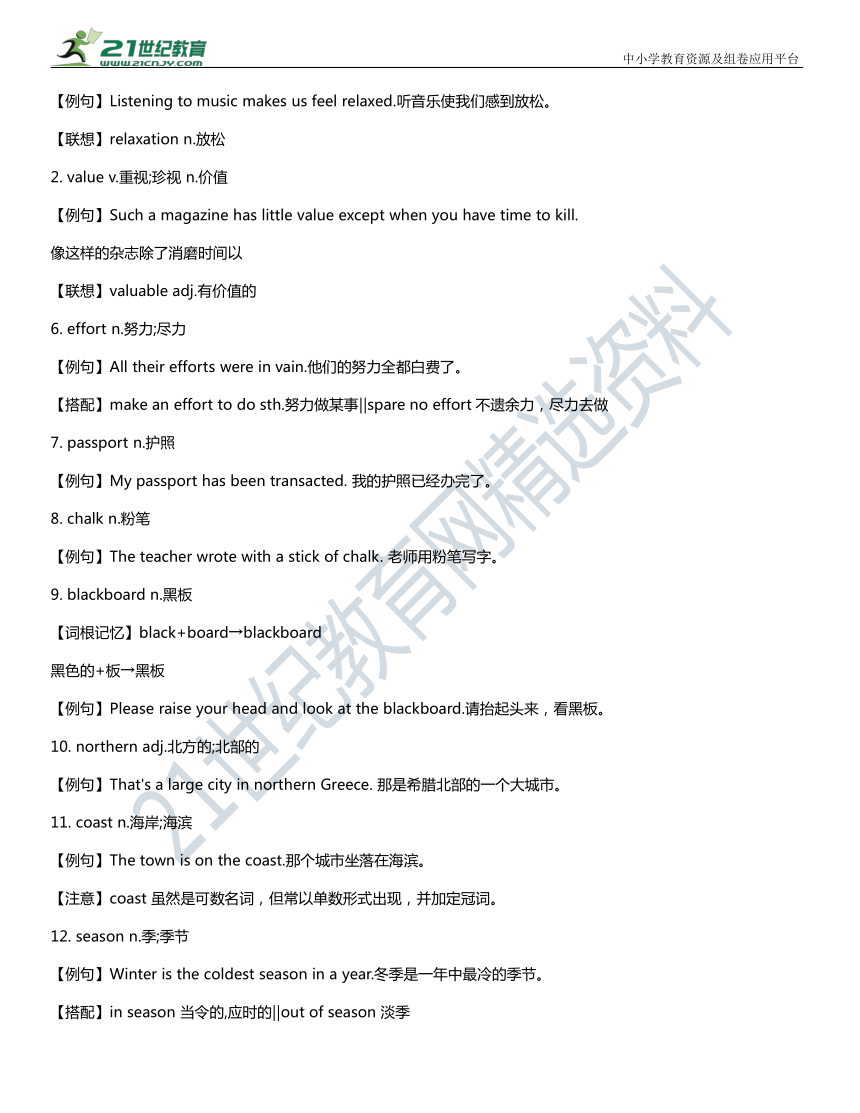
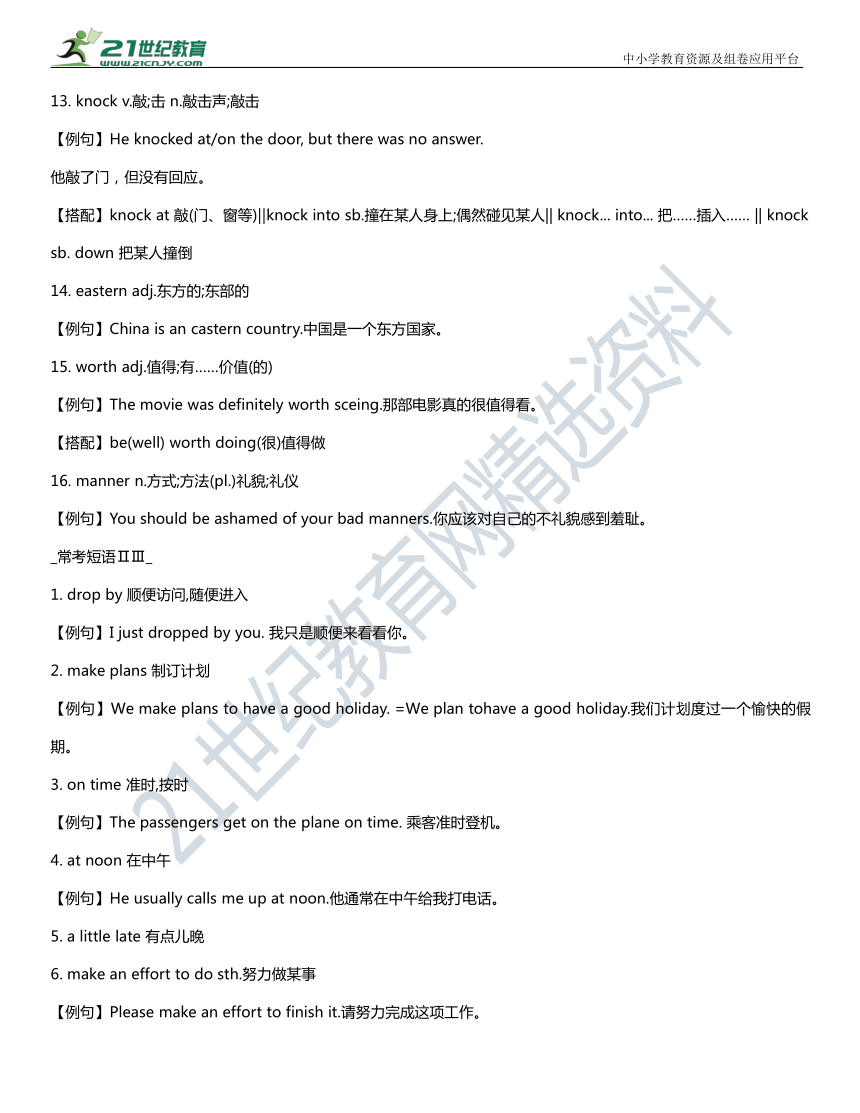
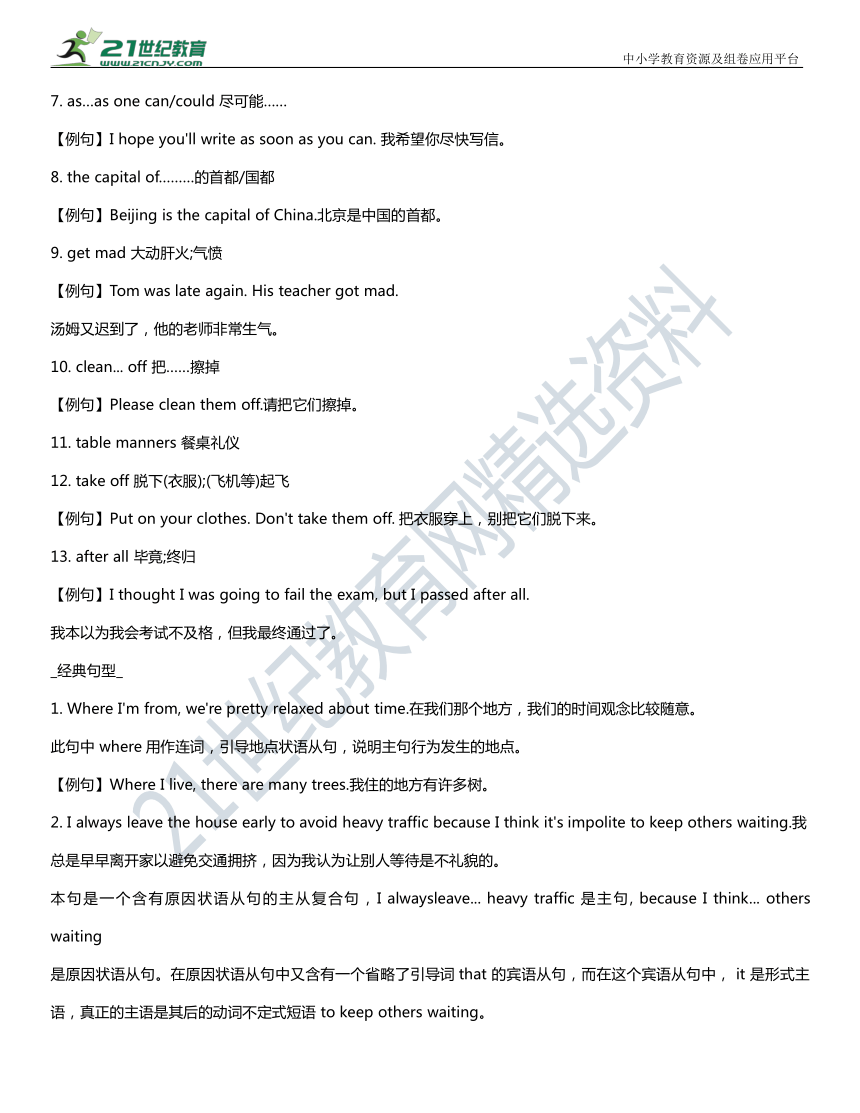
文档简介
中小学教育资源及组卷应用平台
Unit 10 You're supposed to shake hands.
Section A(1a~2d)
_必记单词_
1. custom n.风俗;习俗
【例句】The Japanese customs are different from the Chinese ones.
日本的风俗习惯与中国的不同。
2. bow v.& n.鞠躬
【例句】The speaker bowed to the listeners. 演讲者向听众鞠躬。
3. kiss v. & n.亲吻;接吻
【例句】He gave her a kiss of affection.他给她一个表示爱的吻。
4. greet v.和……打招呼;迎接
【例句】We greeted her by saying“Good morning”.我们向她打招呼,说“早上好”。
【联想】greeting n.问候,招呼
【搭配】greet with 以……迎接……
greet sb. at the airport 在机场迎接某人
常考短语ⅡⅡ_
1. for the first time 首次;初次
2. make friends 交朋友
【例句】I find it difficult to make friends with Jim. 我发现和吉姆交朋友很难。
3. as soon as 一……就……
4. shake hands (with sb.)(与某人)握手
【例句】We usually shake hands with each other.我们通常相互握手。
5. the wrong way 以错误的方式;错误地
【例句】You understood him in the wrong way. 你错误地理解他了。
6. hold out 伸出(手等)
7. greet each other 互相问候
8. to one’s surprise 令某人惊讶的是
经典句型ⅢⅡ
1. That's how people in Japan are expected to greet each other.那就是在日本人们互相问候的方式。
本句含有 how 引导的表语从句。表语从句在句子中作表语,常位于连系动词be, seem, look等后面。how, where, why,because等引导的从句作 This/That is的表语时,表示具体的方式、地点、结果、原因等。
【例句】The question is how he did it.问题是他如何做此事的。
【拓展】表语从句还可由连接词 that 引导,表语从句中 that 一般不省略。
【例句】The trouble is that I have lost his address. 麻烦的是我把他的地址弄丢了。
2. So I just stood there with my hand out.所以我只是伸着手站在那里。
with my hand out 是“with+宾语+宾语补足语”结构,在句中作伴随状语。宾语补足语的形式有现在分词、过去分词、形容词、副词等。
【例句】He is sleeping in the bedroom with the windows open.
他在卧室里开着窗户睡觉。
Section A(3a~4c)
3. capital n.首都;国都
【例句】Beijing is the capital of China.北京是中国的首都。
【联想】capitalist n.资本家;资本主义者
4. noon n.正午;中午
【例句】At noon, the sun is high in the sky. 正午,烈日当空。
【搭配】at noon 在中午
5. mad adj.很生气;疯的
【例句】This morning she was a little mad.
_必记单词_
1. relaxed adj.放松的;自在的
【例句】Listening to music makes us feel relaxed.听音乐使我们感到放松。
【联想】relaxation n.放松
2. value v.重视;珍视 n.价值
【例句】Such a magazine has little value except when you have time to kill.
像这样的杂志除了消磨时间以
【联想】valuable adj.有价值的
6. effort n.努力;尽力
【例句】All their efforts were in vain.他们的努力全都白费了。
【搭配】make an effort to do sth.努力做某事‖spare no effort不遗余力,尽力去做
7. passport n.护照
【例句】My passport has been transacted. 我的护照已经办完了。
8. chalk n.粉笔
【例句】The teacher wrote with a stick of chalk. 老师用粉笔写字。
9. blackboard n.黑板
【词根记忆】black+board→blackboard
黑色的+板→黑板
【例句】Please raise your head and look at the blackboard.请抬起头来,看黑板。
10. northern adj.北方的;北部的
【例句】That's a large city in northern Greece. 那是希腊北部的一个大城市。
11. coast n.海岸;海滨
【例句】The town is on the coast.那个城市坐落在海滨。
【注意】coast 虽然是可数名词,但常以单数形式出现,并加定冠词。
12. season n.季;季节
【例句】Winter is the coldest season in a year.冬季是一年中最冷的季节。
【搭配】in season 当令的,应时的‖out of season 淡季
13. knock v.敲;击 n.敲击声;敲击
【例句】He knocked at/on the door, but there was no answer.
他敲了门,但没有回应。
【搭配】knock at 敲(门、窗等)‖knock into sb.撞在某人身上;偶然碰见某人|| knock... into... 把……插入…… || knock
sb. down 把某人撞倒
14. eastern adj.东方的;东部的
【例句】China is an castern country.中国是一个东方国家。
15. worth adj.值得;有……价值(的)
【例句】The movie was definitely worth sceing.那部电影真的很值得看。
【搭配】be(well) worth doing(很)值得做
16. manner n.方式;方法(pl.)礼貌;礼仪
【例句】You should be ashamed of your bad manners.你应该对自己的不礼貌感到羞耻。
_常考短语ⅡⅢ_
1. drop by 顺便访问,随便进入
【例句】I just dropped by you. 我只是顺便来看看你。
2. make plans 制订计划
【例句】We make plans to have a good holiday. =We plan tohave a good holiday.我们计划度过一个愉快的假期。
3. on time 准时,按时
【例句】The passengers get on the plane on time. 乘客准时登机。
4. at noon 在中午
【例句】He usually calls me up at noon.他通常在中午给我打电话。
5. a little late 有点儿晚
6. make an effort to do sth.努力做某事
【例句】Please make an effort to finish it.请努力完成这项工作。
7. as…as one can/could 尽可能……
【例句】I hope you'll write as soon as you can. 我希望你尽快写信。
8. the capital of………的首都/国都
【例句】Beijing is the capital of China.北京是中国的首都。
9. get mad 大动肝火;气愤
【例句】Tom was late again. His teacher got mad.
汤姆又迟到了,他的老师非常生气。
10. clean... off 把……擦掉
【例句】Please clean them off.请把它们擦掉。
11. table manners 餐桌礼仪
12. take off 脱下(衣服);(飞机等)起飞
【例句】Put on your clothes. Don't take them off. 把衣服穿上,别把它们脱下来。
13. after all 毕竟;终归
【例句】I thought I was going to fail the exam, but I passed after all.
我本以为我会考试不及格,但我最终通过了。
_经典句型_
1. Where I'm from, we're pretty relaxed about time.在我们那个地方,我们的时间观念比较随意。
此句中 where用作连词,引导地点状语从句,说明主句行为发生的地点。
【例句】Where I live, there are many trees.我住的地方有许多树。
2. I always leave the house early to avoid heavy traffic because I think it's impolite to keep others waiting.我
总是早早离开家以避免交通拥挤,因为我认为让别人等待是不礼貌的。
本句是一个含有原因状语从句的主从复合句,I alwaysleave... heavy traffic 是主句, because I think... others waiting
是原因状语从句。在原因状语从句中又含有一个省略了引导词that 的宾语从句,而在这个宾语从句中, it 是形式主语,真正的主语是其后的动词不定式短语 to keep others waiting。
Section B(1a~1d)
_必记单词‖训
empty adj.空的;空洞的
【例句】This is an empty box.这是一个空盒子。
【拓展】(反) full adj.满的
_常考短语_
1. stick... into... 把……插入……
【例句】Don't stick your fork into your food.别把叉子插入食物中。
2. point at 指着
【例句】The teacher is pointing at the blackboard.老师正指着黑板。
3. at the table 在餐桌旁
【例句】The man sat at the table and asked for a cup of tea.那名男子坐在餐桌旁边,要了一杯茶。
4. hit an empty bowl敲击一个空碗
Section B(2a~3b)
_必记单词‖训
1. basic adj.基本的;基础的
【例句】You should master the basic theory of language teaching.
你应该掌握语言教学的基本理论。
2. exchange n.& v.交换
【例句】An exchange of ideas is helpful. 相互交流想法是有帮助的。
3. teenage adj.十几岁的;青少年的
【例句】The teenage actor is very popular. 那个少年演员非常受欢迎。
4. granddaughter n.(外)孙女
【例句】Her granddaughter lives abroad.她的孙女住在国外。
5. behave v.表现;举止
【趣记】be+have(有)→举止优雅→有礼貌
【例句】He has behaved well at school.他在学校表现良好。
【联想】behavior n.行为,举止
6. except prep.除……之外 conj.除了;只是
【例句】They didn't open their mouths except to complain.除了抱怨他们从不开口。
7. elbow n.肘;胳膊
8. gradually adv.逐步地;渐进地
【例句】His health is gradually improving.他的健康渐有起色。
9. suggestion n.建议
【例句】I have a suggestion to make. 我有个建议要提。
【联想】suggest v.提议,建议
【搭配】make a suggestion 提出建议
_常考短语_
1. have a great time 玩得高兴,过得愉快
2. make... feel at home 使(某人)感到宾至如归
【例句】His kindness makes me feel at home.他的仁慈使我感到宾至如归。
3. talk to sb.和某人说话
【例句】Don't talk to me about that boy. 不要和我谈论那个男孩。
4. the biggest challenge 最大的挑战
5. cut up 切碎
6. show up 出席;露面
【例句】We waited for him for a long time, but he didn't show up.我们等了他很长时间,但他没有露面。
7. get out of one’s way特地;格外努力
8. be different from 和……不同
9. on one’s plate 在某人的盘子里
10. thanks for 为……感谢
_经典句型_||||_
1. So she actually learned how to make Chinese food! 所以她竟然学习如何做中餐!
how to make Chinese food 为“疑问词+动词不定式”结构,在句中作 learned的宾语。
【例句】I want to learn how to make dumplings.我想学习如何包饺子。
【拓展】动词不定式与疑问词 who, which, when, where,how, what 等连用时,常作 tell, show, know, learn, teach,
explain, decide 等动词的宾语,构成“疑问词+动词不定式”结构.可转换成宾语从句。
【例句】He didn't know what to say. =He didn't know what he should say.他不知道该说什么。
2. I have to say that I find it difficult to remember everything, but I'm gradually getting used to it.我不得不
说,我发现记住所有的事情是困难的,但是我正在逐渐习惯这些事情。
“find it+adj.+to do sth.”意为“发现做某事是……的”。find后接复合宾语,其中it在此处作形式宾语,真正的宾语是后面的动词不定式to do sth. ,形容词在句中作宾语补足语。
【例句】I found it hard to finish the work alone. 我发现独自完成那项工作很难。
3. She never knew what she was supposed to do at the dinner table.她从来不知道在餐桌上她应该做什么。
本句中 what she was supposed to do at the dinner table 是宾语从句,在句中作 knew的宾语。在含有宾语从句的重合句中,主句用了一般过去时,宾语从句通常也要使用过去的某种时态。
【例句】He asked me where the children were going to skate on Sunday.他问我孩子们周日要去哪里滑冰。
单元语法
1. be supposed to do sth. 与 be expected to do sth.句型短语意义用法例句
be suppo-sed to dosth.“应该做某事”,相当于 should/ought todo sth.二者都用来表示根据规定或传统习惯人们不得不做某事或期待发生某事,可进行互换。二者中的 toYou're supposed to makenoise while eating noo-dles. = You're expected be expec-ted to dosth.“应该做某事;被期望做某事”均为动词不定式的符号,不是介词,其后要跟动词原形, be 随人称和时态的变化而变化to make noise while eat-ing noodles.吃面条时,你应该发出响声。
1.当 be supposed to... 的主语是“人”时,意为“应该,被期望……”,它可以用来表示劝告、建议、义务、责任等,相当于情态动词 should。
You're supposed to ask the teacher if you want to leave theclassroom. 如果你要离开教室的话,应该先问问老师。
2.当 be supposed to...的主语是“物”时,意为“本应,本该”,用于表示某事本应该发生而没有发生。
The meeting is supposed to take place on Tuesday, but we haveto put it off. 这次会议本应在星期二举行,但我们不得不把它推迟了。
3. was/were supposed to do sth. 相当于 should have done sth.,表示“(过去)本应该做某事而实际上并没有做”。
You were supposed to arrive here at 6:00.你本应该6点钟到这儿。
4. be supposed to...还可用于表示“被认为……,被相信是……”。
This house is supposed to be his.这所房子被认为是他的。
5. be supposed to...的否定结构为 be not supposed to...,它常用于口语中,意为“不被许可……,不应当……”。
You are not supposed to do that. 你不应当做那件事。
【例1】Animals are our close friends. We are supposed them.
A. to protectB. protectingC. protect
【解析】be supposed to do sth.“应该/被期望做某事”,为固定用法。故选 A。
【答案】A
2. It+be+adj.+to do sth.句型
1. It+be+adj.+to do sth.意为“做某事是……的”, it 为形式主语,真正的主语是后面的动词不定式(短语)。因动词不定式(短语)作主语较长,而谓语部分相对较短,用 it代替后就避免了“头重脚轻”的现象。
I think it's important to sleep eight hours a night.我认为每晚睡8个小时很重要。
2.表示“(对某人来说)做某事是……的”,用句型IIt+bc+adj.+for/of sb.+to do sth.其中sb.为动词不定式to do sth.的逻辑主语。二者的具体用法为:
It+be+adj.+for sb. + to dosth.此句型中的形容词为描述事物特征的词.如 difficult, important, easy, hard, necessa-ry. possible, dangerous, impossible等,是说明动词不定式的。
It+be+adj.+ofsb.+to do sth.此句型中的形容词为描述人物品质及性格特征的词,如 clever, foolish, good, kind,nice, polite等,用来说明of后的 sb.。
It's hard for me to answer your question.对我来说回答你的问题很难。
It was foolish of him to go alone.他单独去太傻了。
【例2】—Let me help you carry the box, Granny.
—Thank you, Li Lei. It's very nice _you _me
A. of; to helpB. for; to help
C. of; helpingD. for; helping
【解析】It's+adj.+for/of sb.+to do sth.“(对某人来说)做某事是……的”.为固定句型,又因句中的形容词 nice 是描述人的品行的词,故介词要用of。
【答案】A
Unit 10 You're supposed to shake hands.
Section A(1a~2d)
_必记单词_
1. custom n.风俗;习俗
【例句】The Japanese customs are different from the Chinese ones.
日本的风俗习惯与中国的不同。
2. bow v.& n.鞠躬
【例句】The speaker bowed to the listeners. 演讲者向听众鞠躬。
3. kiss v. & n.亲吻;接吻
【例句】He gave her a kiss of affection.他给她一个表示爱的吻。
4. greet v.和……打招呼;迎接
【例句】We greeted her by saying“Good morning”.我们向她打招呼,说“早上好”。
【联想】greeting n.问候,招呼
【搭配】greet with 以……迎接……
greet sb. at the airport 在机场迎接某人
常考短语ⅡⅡ_
1. for the first time 首次;初次
2. make friends 交朋友
【例句】I find it difficult to make friends with Jim. 我发现和吉姆交朋友很难。
3. as soon as 一……就……
4. shake hands (with sb.)(与某人)握手
【例句】We usually shake hands with each other.我们通常相互握手。
5. the wrong way 以错误的方式;错误地
【例句】You understood him in the wrong way. 你错误地理解他了。
6. hold out 伸出(手等)
7. greet each other 互相问候
8. to one’s surprise 令某人惊讶的是
经典句型ⅢⅡ
1. That's how people in Japan are expected to greet each other.那就是在日本人们互相问候的方式。
本句含有 how 引导的表语从句。表语从句在句子中作表语,常位于连系动词be, seem, look等后面。how, where, why,because等引导的从句作 This/That is的表语时,表示具体的方式、地点、结果、原因等。
【例句】The question is how he did it.问题是他如何做此事的。
【拓展】表语从句还可由连接词 that 引导,表语从句中 that 一般不省略。
【例句】The trouble is that I have lost his address. 麻烦的是我把他的地址弄丢了。
2. So I just stood there with my hand out.所以我只是伸着手站在那里。
with my hand out 是“with+宾语+宾语补足语”结构,在句中作伴随状语。宾语补足语的形式有现在分词、过去分词、形容词、副词等。
【例句】He is sleeping in the bedroom with the windows open.
他在卧室里开着窗户睡觉。
Section A(3a~4c)
3. capital n.首都;国都
【例句】Beijing is the capital of China.北京是中国的首都。
【联想】capitalist n.资本家;资本主义者
4. noon n.正午;中午
【例句】At noon, the sun is high in the sky. 正午,烈日当空。
【搭配】at noon 在中午
5. mad adj.很生气;疯的
【例句】This morning she was a little mad.
_必记单词_
1. relaxed adj.放松的;自在的
【例句】Listening to music makes us feel relaxed.听音乐使我们感到放松。
【联想】relaxation n.放松
2. value v.重视;珍视 n.价值
【例句】Such a magazine has little value except when you have time to kill.
像这样的杂志除了消磨时间以
【联想】valuable adj.有价值的
6. effort n.努力;尽力
【例句】All their efforts were in vain.他们的努力全都白费了。
【搭配】make an effort to do sth.努力做某事‖spare no effort不遗余力,尽力去做
7. passport n.护照
【例句】My passport has been transacted. 我的护照已经办完了。
8. chalk n.粉笔
【例句】The teacher wrote with a stick of chalk. 老师用粉笔写字。
9. blackboard n.黑板
【词根记忆】black+board→blackboard
黑色的+板→黑板
【例句】Please raise your head and look at the blackboard.请抬起头来,看黑板。
10. northern adj.北方的;北部的
【例句】That's a large city in northern Greece. 那是希腊北部的一个大城市。
11. coast n.海岸;海滨
【例句】The town is on the coast.那个城市坐落在海滨。
【注意】coast 虽然是可数名词,但常以单数形式出现,并加定冠词。
12. season n.季;季节
【例句】Winter is the coldest season in a year.冬季是一年中最冷的季节。
【搭配】in season 当令的,应时的‖out of season 淡季
13. knock v.敲;击 n.敲击声;敲击
【例句】He knocked at/on the door, but there was no answer.
他敲了门,但没有回应。
【搭配】knock at 敲(门、窗等)‖knock into sb.撞在某人身上;偶然碰见某人|| knock... into... 把……插入…… || knock
sb. down 把某人撞倒
14. eastern adj.东方的;东部的
【例句】China is an castern country.中国是一个东方国家。
15. worth adj.值得;有……价值(的)
【例句】The movie was definitely worth sceing.那部电影真的很值得看。
【搭配】be(well) worth doing(很)值得做
16. manner n.方式;方法(pl.)礼貌;礼仪
【例句】You should be ashamed of your bad manners.你应该对自己的不礼貌感到羞耻。
_常考短语ⅡⅢ_
1. drop by 顺便访问,随便进入
【例句】I just dropped by you. 我只是顺便来看看你。
2. make plans 制订计划
【例句】We make plans to have a good holiday. =We plan tohave a good holiday.我们计划度过一个愉快的假期。
3. on time 准时,按时
【例句】The passengers get on the plane on time. 乘客准时登机。
4. at noon 在中午
【例句】He usually calls me up at noon.他通常在中午给我打电话。
5. a little late 有点儿晚
6. make an effort to do sth.努力做某事
【例句】Please make an effort to finish it.请努力完成这项工作。
7. as…as one can/could 尽可能……
【例句】I hope you'll write as soon as you can. 我希望你尽快写信。
8. the capital of………的首都/国都
【例句】Beijing is the capital of China.北京是中国的首都。
9. get mad 大动肝火;气愤
【例句】Tom was late again. His teacher got mad.
汤姆又迟到了,他的老师非常生气。
10. clean... off 把……擦掉
【例句】Please clean them off.请把它们擦掉。
11. table manners 餐桌礼仪
12. take off 脱下(衣服);(飞机等)起飞
【例句】Put on your clothes. Don't take them off. 把衣服穿上,别把它们脱下来。
13. after all 毕竟;终归
【例句】I thought I was going to fail the exam, but I passed after all.
我本以为我会考试不及格,但我最终通过了。
_经典句型_
1. Where I'm from, we're pretty relaxed about time.在我们那个地方,我们的时间观念比较随意。
此句中 where用作连词,引导地点状语从句,说明主句行为发生的地点。
【例句】Where I live, there are many trees.我住的地方有许多树。
2. I always leave the house early to avoid heavy traffic because I think it's impolite to keep others waiting.我
总是早早离开家以避免交通拥挤,因为我认为让别人等待是不礼貌的。
本句是一个含有原因状语从句的主从复合句,I alwaysleave... heavy traffic 是主句, because I think... others waiting
是原因状语从句。在原因状语从句中又含有一个省略了引导词that 的宾语从句,而在这个宾语从句中, it 是形式主语,真正的主语是其后的动词不定式短语 to keep others waiting。
Section B(1a~1d)
_必记单词‖训
empty adj.空的;空洞的
【例句】This is an empty box.这是一个空盒子。
【拓展】(反) full adj.满的
_常考短语_
1. stick... into... 把……插入……
【例句】Don't stick your fork into your food.别把叉子插入食物中。
2. point at 指着
【例句】The teacher is pointing at the blackboard.老师正指着黑板。
3. at the table 在餐桌旁
【例句】The man sat at the table and asked for a cup of tea.那名男子坐在餐桌旁边,要了一杯茶。
4. hit an empty bowl敲击一个空碗
Section B(2a~3b)
_必记单词‖训
1. basic adj.基本的;基础的
【例句】You should master the basic theory of language teaching.
你应该掌握语言教学的基本理论。
2. exchange n.& v.交换
【例句】An exchange of ideas is helpful. 相互交流想法是有帮助的。
3. teenage adj.十几岁的;青少年的
【例句】The teenage actor is very popular. 那个少年演员非常受欢迎。
4. granddaughter n.(外)孙女
【例句】Her granddaughter lives abroad.她的孙女住在国外。
5. behave v.表现;举止
【趣记】be+have(有)→举止优雅→有礼貌
【例句】He has behaved well at school.他在学校表现良好。
【联想】behavior n.行为,举止
6. except prep.除……之外 conj.除了;只是
【例句】They didn't open their mouths except to complain.除了抱怨他们从不开口。
7. elbow n.肘;胳膊
8. gradually adv.逐步地;渐进地
【例句】His health is gradually improving.他的健康渐有起色。
9. suggestion n.建议
【例句】I have a suggestion to make. 我有个建议要提。
【联想】suggest v.提议,建议
【搭配】make a suggestion 提出建议
_常考短语_
1. have a great time 玩得高兴,过得愉快
2. make... feel at home 使(某人)感到宾至如归
【例句】His kindness makes me feel at home.他的仁慈使我感到宾至如归。
3. talk to sb.和某人说话
【例句】Don't talk to me about that boy. 不要和我谈论那个男孩。
4. the biggest challenge 最大的挑战
5. cut up 切碎
6. show up 出席;露面
【例句】We waited for him for a long time, but he didn't show up.我们等了他很长时间,但他没有露面。
7. get out of one’s way特地;格外努力
8. be different from 和……不同
9. on one’s plate 在某人的盘子里
10. thanks for 为……感谢
_经典句型_||||_
1. So she actually learned how to make Chinese food! 所以她竟然学习如何做中餐!
how to make Chinese food 为“疑问词+动词不定式”结构,在句中作 learned的宾语。
【例句】I want to learn how to make dumplings.我想学习如何包饺子。
【拓展】动词不定式与疑问词 who, which, when, where,how, what 等连用时,常作 tell, show, know, learn, teach,
explain, decide 等动词的宾语,构成“疑问词+动词不定式”结构.可转换成宾语从句。
【例句】He didn't know what to say. =He didn't know what he should say.他不知道该说什么。
2. I have to say that I find it difficult to remember everything, but I'm gradually getting used to it.我不得不
说,我发现记住所有的事情是困难的,但是我正在逐渐习惯这些事情。
“find it+adj.+to do sth.”意为“发现做某事是……的”。find后接复合宾语,其中it在此处作形式宾语,真正的宾语是后面的动词不定式to do sth. ,形容词在句中作宾语补足语。
【例句】I found it hard to finish the work alone. 我发现独自完成那项工作很难。
3. She never knew what she was supposed to do at the dinner table.她从来不知道在餐桌上她应该做什么。
本句中 what she was supposed to do at the dinner table 是宾语从句,在句中作 knew的宾语。在含有宾语从句的重合句中,主句用了一般过去时,宾语从句通常也要使用过去的某种时态。
【例句】He asked me where the children were going to skate on Sunday.他问我孩子们周日要去哪里滑冰。
单元语法
1. be supposed to do sth. 与 be expected to do sth.句型短语意义用法例句
be suppo-sed to dosth.“应该做某事”,相当于 should/ought todo sth.二者都用来表示根据规定或传统习惯人们不得不做某事或期待发生某事,可进行互换。二者中的 toYou're supposed to makenoise while eating noo-dles. = You're expected be expec-ted to dosth.“应该做某事;被期望做某事”均为动词不定式的符号,不是介词,其后要跟动词原形, be 随人称和时态的变化而变化to make noise while eat-ing noodles.吃面条时,你应该发出响声。
1.当 be supposed to... 的主语是“人”时,意为“应该,被期望……”,它可以用来表示劝告、建议、义务、责任等,相当于情态动词 should。
You're supposed to ask the teacher if you want to leave theclassroom. 如果你要离开教室的话,应该先问问老师。
2.当 be supposed to...的主语是“物”时,意为“本应,本该”,用于表示某事本应该发生而没有发生。
The meeting is supposed to take place on Tuesday, but we haveto put it off. 这次会议本应在星期二举行,但我们不得不把它推迟了。
3. was/were supposed to do sth. 相当于 should have done sth.,表示“(过去)本应该做某事而实际上并没有做”。
You were supposed to arrive here at 6:00.你本应该6点钟到这儿。
4. be supposed to...还可用于表示“被认为……,被相信是……”。
This house is supposed to be his.这所房子被认为是他的。
5. be supposed to...的否定结构为 be not supposed to...,它常用于口语中,意为“不被许可……,不应当……”。
You are not supposed to do that. 你不应当做那件事。
【例1】Animals are our close friends. We are supposed them.
A. to protectB. protectingC. protect
【解析】be supposed to do sth.“应该/被期望做某事”,为固定用法。故选 A。
【答案】A
2. It+be+adj.+to do sth.句型
1. It+be+adj.+to do sth.意为“做某事是……的”, it 为形式主语,真正的主语是后面的动词不定式(短语)。因动词不定式(短语)作主语较长,而谓语部分相对较短,用 it代替后就避免了“头重脚轻”的现象。
I think it's important to sleep eight hours a night.我认为每晚睡8个小时很重要。
2.表示“(对某人来说)做某事是……的”,用句型IIt+bc+adj.+for/of sb.+to do sth.其中sb.为动词不定式to do sth.的逻辑主语。二者的具体用法为:
It+be+adj.+for sb. + to dosth.此句型中的形容词为描述事物特征的词.如 difficult, important, easy, hard, necessa-ry. possible, dangerous, impossible等,是说明动词不定式的。
It+be+adj.+ofsb.+to do sth.此句型中的形容词为描述人物品质及性格特征的词,如 clever, foolish, good, kind,nice, polite等,用来说明of后的 sb.。
It's hard for me to answer your question.对我来说回答你的问题很难。
It was foolish of him to go alone.他单独去太傻了。
【例2】—Let me help you carry the box, Granny.
—Thank you, Li Lei. It's very nice _you _me
A. of; to helpB. for; to help
C. of; helpingD. for; helping
【解析】It's+adj.+for/of sb.+to do sth.“(对某人来说)做某事是……的”.为固定句型,又因句中的形容词 nice 是描述人的品行的词,故介词要用of。
【答案】A
同课章节目录
- Unit 1 How can we become good learners.
- Section A
- Section B
- Unit 2 I think that mooncakes are delicious!
- Section A
- Section B
- Unit 3 Could you please tell me where the restroom
- Section A
- Section B
- Unit 4 I used to be afraid of the dark.
- Section A
- Section B
- Unit 5 What are the shirts made of?
- Section A
- Section B
- Review of Units 1-5
- Unit 6 When was it invented?
- Section A
- Section B
- Unit 7 Teenagers should be allowed to choose their
- Section A
- Section B
- Unit 8 It must belong to Carla.
- Section A
- Section B
- Unit 9 I like music that I can dance to.
- Section A
- Section B
- Unit 10 You're supposed to shake hands.
- Section A
- Section B
- Review of Units 6-10
- Unit 11 Sad movies make me cry.
- Section A
- Section B
- Unit 12 Life is full of the unexpected
- Section A
- Section B
- Unit 13 We're trying to save the earth!
- Section A
- Section B
- Unit 14 I remember meeting all of you in Grade 7.
- Section A
- Section B
- Review of Units 11-14
